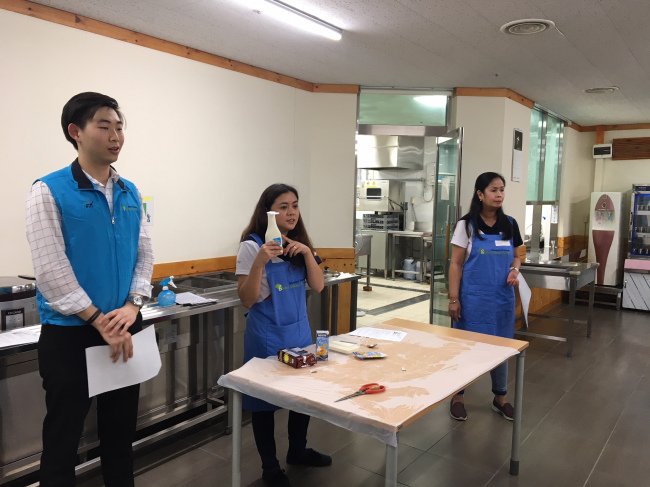On a humid July afternoon, a dozen foreign residents descended on the Yongsan Center for the Disabled to help local disabled students in their monthly cooking class.
The volunteers came from all walks of life. Some took time off from their full-time work. There were also teenagers from a local international school and stay-at-home parents.
“It is a good way to know Korea,” said Cielo, a full-time worker currently on summer break. This was her first visit to the center. “I have only been here (in Seoul) for about a year, so I want to interact with local Koreans all the time.”
The volunteering session presented a rare opportunity for foreign visitors to interact with local young adults who are mentally disabled and struggle with complex levels of manual dexterity. For regular volunteers like the three teenage friends from a local school, it is a way of spending time on a worthwhile initiative.
 |
Caption: Taylor (left), from the Itaewon Global Village Center, and Katherine Corteza, instructor from the Philippine Women’s Club demonstrate how to make a dish. (Itaewon Global Village Center) |
“We are not here because of school requirements or something like that. We have been doing this for a while now,” said one of the teenagers, who did not want to be named.
Before entering the center, Katherine Corteza, the volunteer coordinator, reminded the group to avoid using “banmal” -- an informal way of talking in Korea -- during interactions with students, who are adults despite their youthful appearance.
The goal of the visit was to help the students become more independent by developing their cooking abilities. She stressed not to do everything for the students and to only assist them when necessary.
Upon entering the kitchen area, the excited cheers and high-fives made clear there were friendships established from previous visits.
Sarah, a French and Spanish language teacher and regular volunteer, was engrossed in competition with a student to one-up each other in naming German car brands. A table away, another student was catching up with Adeline, one of the teenage volunteers, on her school life.
Conversations flowed uninhibitedly as many students treated the visit as an opportunity to not only make delicious food, but also practice English-speaking skills with foreign friends.
The students were curious and showed a strong appetite to learn new skills. And today they found people willing to listen, share and give them a fair chance to demonstrate their abilities.
“Today, we will be making Filipino desserts. We will make the mango royale cake first and then the buko pandan salad,” the demonstrator from the Philippine Women’s Club announced.
The students followed instructions attentively and completed the steps with only minimal assistance.
The volunteers mostly supervised and helped with fine motor skills the students struggled with, such as using scissors.
For the mango royale cake, one student added the condensed milk into a bowl of all-purpose cream, while another used an egg beater to mix the ingredients. They then had to fill a small glass jar with repeated layers of biscuit crumbs, diced mango and the mixed cream.
A similar collaborative spirit was displayed to prepare the buko padan salad. Shredded coconut, sweet cream and green gelatin were mixed together to form the beloved Filipino dessert.
“Buko padan salad is a popular dessert for family gatherings and big holidays,” a helper from the Philippine Women’s Club explained. Looking around the room, it felt just like that: a warm family gathering filled with personal stories and laughter.
The program, arranged by the Itaewon Global Village Center, was designed to contribute to the center’s overall goal of enhancing the social integration of the disabled in Korea.
Corteza, the director of the Itaewon Center, identified cooking as the easiest way for foreign volunteers to bond with the local disabled students.
“We might not be able to understand each other, but there is a connection between them and the foreign volunteers.
“We hope through this activity, foreigners will be able to give back to the community and also share their culture,” Corteza said.
Most importantly, the initiative is about spreading kindness to one of the most vulnerable groups in society.
According to last year’s Reports on Human Rights Practice by the US Department of State, people with disabilities in Korea still experience direct discrimination in many aspects of life.
“Those students may be disabled physically or mentally, but they are very pure in a sense that they don’t have prejudice against foreigners,” Corteza pointed out. By sharing and experiencing kindness in return, she hoped people could forget prejudices against disabled people.
As the visit drew to a close, the only blemish on an otherwise fulfilling day was that the group could not enjoy their own work immediately -- the final products needed to be frozen first.
By Aaron yip, intern reporter
(
aaron.yhla@heraldcorp.com)








